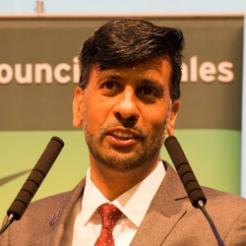The director of Islamic Relief UK said that if his charity was being formed today, the climate towards Muslim charities would have stopped it from getting the success it has had.
Speaking to a fringe event, run by Acevo alongside the Muslim Charities Forum, at the Labour Conference on Tuesday, Jehangir Malik (pictured) told delegates that: “had we been formed as late as recently, I’m not sure we would have progressed to the level we are at now”.
Malik, who is on the MCF board, said that in 2007, he was interviewed for Al Jazeera and asked why Islamic Relief is based in Britain as an Islamic development organisation. He answered by saying, that “it is because we are based in Britain that we are providing the environment that we can flourish and develop in as a civil society and humanitarian development organisation”.
But, he said, “fast-forward seven years and I think we are in a very different climate.”
He told the event, which was called ‘Friend or Foe? Faith and British Charities: The Muslim Question’, that: “It’s a very dangerous climate. In which, the language is very divisive and the environment is where the fear will push the international organisations and charities into corners and side-lines, as opposed to the main stream”.
Malik, who announced last week that he was leaving the charity this month after 23 years, said that Islamic Relief was fortunate because it became a member of the Disasters Emergency Committee, and engaged with DfID, and had an open platform where it was able to mature and raise its game. But that Muslim charities today are not in the same position.
Bank account closures
He spoke of the problems Muslim charities have had in terms of banks closing the accounts of certain Muslim charities and organisations.
He said: “A bank can close down our account and has done overnight. There is nothing worse than having no bank to operate. And with it all being done so without any due process.”
Malik said he has had conversations with people at these banks, alongside members of MCF, to try to get them to “understand the context in which we are operating in”. But that these problems are still ongoing.
He said without bank accounts, “we run the risk of putting money underground, of not being allowed to see the flow of cash running across”.
Malik concluded: “We have absolutely nothing to hide, but treat us fairly, as we treat everyone else”.
Tulip Sadiq, MP for Hampstead and Kilburn, told the room that “the scrutiny that Muslim charities face far exceeds their sector counterparts”.
She said of the environment that charities are operating in at the moment, in terms of scrutiny on Muslim charities and of charities’ fundraising practices, “it feels a bit like you are guilty until proven innocent, which is “not the way charities should be”.
She said: “If a charity is genuinely engaging in extremism or terrorist activities, of course we must crack down on that, but let’s not give them that label unless they have managed to prove it”.










